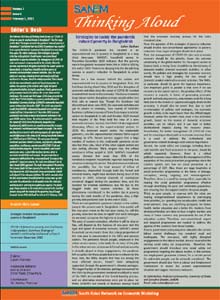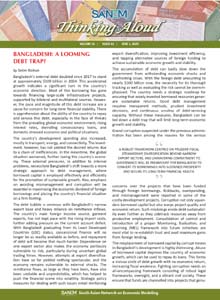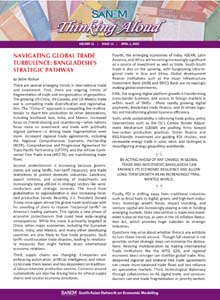
Thinking Aloud: Volume VII, Issue 9: February 2021
 The February 2021 issue of Thinking Aloud focuses on “COVID-19 fallout on poverty and livelihoods in Bangladesh”. The first page article titled “Strategies to tackle the pandemic induced poverty in Bangladesh” highlighted that the COVID-19 pandemic has resulted in an unprecedented rise in poverty in Bangladesh in a very short time-span. The article emphasizes that strategies of poverty reduction in Bangladesh should involve non-conventional approaches to poverty reduction. The management of COVID-19 crisis and economic recovery should be the priority. Given the extreme uncertainty in the global market for the export sectors to bounce back, a strong focus should be on the recovery of domestic-market oriented economic activities. Also, the social safety net coverage, including direct cash transfer and food assistance to the poor, should be widely expanded. There should also be non-conventional, urgent and targeted programs to address the agonies of the students with highly disrupted educational activities during the pandemic. Finally, government policy response should also address the current labor market challenges. The second and third pages of this issue presents the article titled “COVID-19 fallout on poverty and livelihoods in Bangladesh: Summary findings of SANEM’s nationwide household survey in November-December 2020”. The article presented the results from SANEM’s nationwide household survey which was conducted from 2 November to 17 December 2020 to ensure sustainable and evidence-based development pathways in the post-COVID context. Hence, the article attempted to understand the impact of COVID-19 on PIE (Poverty, Inequality and Employment), which remains an essential prerequisite to assess the pandemic’s multidimensional impacts on people. The article was based on a research with primary purpose of capturing the overall differences in the status of PIE among households between pre-COVID and post-COVID times. The survey questionnaire contained questions related to income, employment, education, expenditure, remittances, experiences with COVID-19 aid and social protection programs. Since the households used in both surveys are same, a panel data has been formed, which is extremely beneficial for such analysis. No systematic bias in response or attrition from the survey was found. To measure the pandemic’s impact on poverty, the study team followed Cost of Basic Needs (CBN) approach. The study team updated the poverty line incomes (both the lower poverty line and the upper poverty line) based on the 2018 Household Survey conducted by SANEM and adjusted it for adequate inflation. The article concludes that the first-hand numbers from field that this survey came up with can assist the policymakers to adequately revise the strategies and devise short- and long-term policies as required. The fourth page draws attention to the events that occurred in the month of January along with the details of the upcoming Bay of Bengal Economic Forum 2021 which will be held on 8-11 February, 2021.
The February 2021 issue of Thinking Aloud focuses on “COVID-19 fallout on poverty and livelihoods in Bangladesh”. The first page article titled “Strategies to tackle the pandemic induced poverty in Bangladesh” highlighted that the COVID-19 pandemic has resulted in an unprecedented rise in poverty in Bangladesh in a very short time-span. The article emphasizes that strategies of poverty reduction in Bangladesh should involve non-conventional approaches to poverty reduction. The management of COVID-19 crisis and economic recovery should be the priority. Given the extreme uncertainty in the global market for the export sectors to bounce back, a strong focus should be on the recovery of domestic-market oriented economic activities. Also, the social safety net coverage, including direct cash transfer and food assistance to the poor, should be widely expanded. There should also be non-conventional, urgent and targeted programs to address the agonies of the students with highly disrupted educational activities during the pandemic. Finally, government policy response should also address the current labor market challenges. The second and third pages of this issue presents the article titled “COVID-19 fallout on poverty and livelihoods in Bangladesh: Summary findings of SANEM’s nationwide household survey in November-December 2020”. The article presented the results from SANEM’s nationwide household survey which was conducted from 2 November to 17 December 2020 to ensure sustainable and evidence-based development pathways in the post-COVID context. Hence, the article attempted to understand the impact of COVID-19 on PIE (Poverty, Inequality and Employment), which remains an essential prerequisite to assess the pandemic’s multidimensional impacts on people. The article was based on a research with primary purpose of capturing the overall differences in the status of PIE among households between pre-COVID and post-COVID times. The survey questionnaire contained questions related to income, employment, education, expenditure, remittances, experiences with COVID-19 aid and social protection programs. Since the households used in both surveys are same, a panel data has been formed, which is extremely beneficial for such analysis. No systematic bias in response or attrition from the survey was found. To measure the pandemic’s impact on poverty, the study team followed Cost of Basic Needs (CBN) approach. The study team updated the poverty line incomes (both the lower poverty line and the upper poverty line) based on the 2018 Household Survey conducted by SANEM and adjusted it for adequate inflation. The article concludes that the first-hand numbers from field that this survey came up with can assist the policymakers to adequately revise the strategies and devise short- and long-term policies as required. The fourth page draws attention to the events that occurred in the month of January along with the details of the upcoming Bay of Bengal Economic Forum 2021 which will be held on 8-11 February, 2021.



